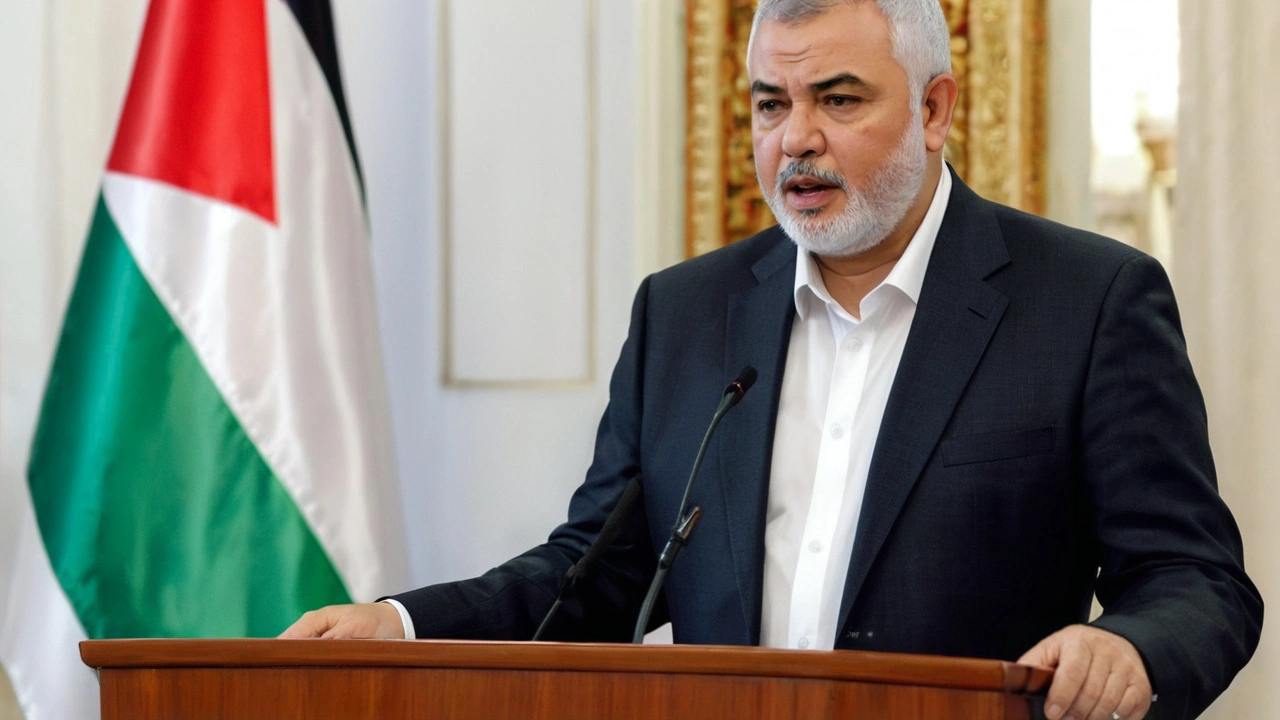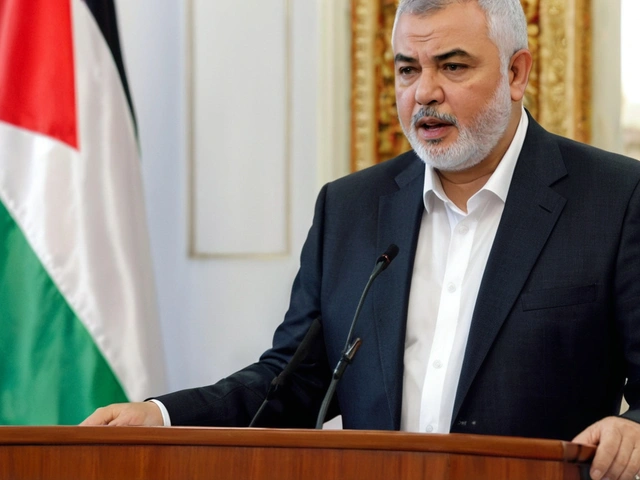Ismail Haniyeh Assassinated in Tehran Amid Escalating Middle East Conflict
The Middle East has once again been thrust into the spotlight with the assassination of Ismail Haniyeh, the political chief of Hamas, in Tehran. Early Wednesday morning, news broke that Haniyeh was killed in what Hamas has called 'a treacherous Zionist raid on his residence in Tehran.' This assassination has sent shockwaves throughout the region, marking a significant escalation in the longstanding conflict between Israel and Hamas. Haniyeh was in Iran to attend the presidential inauguration, a visit that ended in a violent and unforeseen manner.
The Impact of Ismail Haniyeh's Leadership
Ismail Haniyeh was a prominent figure in Hamas for nearly two decades, playing a pivotal role in high-stakes negotiations and diplomacy. From his early days as the leader of Hamas in Gaza in 2006, where he briefly served as prime minister of a Palestinian unity government, to his role as the head of Hamas' political bureau in 2017, Haniyeh's influence was unmistakable. He led the group from abroad, residing in countries such as Qatar and Turkey, and was at the forefront of negotiations mediated by Egypt, Qatar, and the United States. These negotiations aimed to end the ongoing war in Gaza in exchange for hostages captured during a Hamas-led attack on Israel on October 7, which resulted in over 1,200 Israeli deaths and around 250 captures.
A History of Conflict
The assassination of Haniyeh comes in the wake of intensified hostilities between Israel and Hamas. Following the attack on Israel, which was one of the deadliest in recent history, Israel's leaders vowed revenge on Hamas officials. This has led to a relentless campaign of airstrikes and ground operations over the past 10 months, resulting in the deaths of nearly 40,000 Palestinians. The violence has reached a new zenith with Haniyeh's assassination, a stark reminder of the enduring and multifaceted nature of the Middle East conflict.
The Immediate Fallout
In the immediate aftermath of Haniyeh's assassination, Hamas has vowed to retaliate. This promise of retaliation adds another layer of tension to an already volatile situation. The assassination has not only destabilized ongoing diplomatic efforts but also threatened to unleash another wave of violence in the region. Hamas' response to Haniyeh's death will likely determine the next phase of this protracted conflict. The group's leadership has emphasized that they consider this act an egregious provocation that demands a forceful response.
Global Reactions and Implications
International reactions to the assassination have been swift. Various governments and organizations have condemned the act, urging restraint and calling for renewed efforts toward peace negotiations. The geopolitical ramifications of Haniyeh's assassination are profound. As one of the most influential figures in Hamas, his death could lead to a power vacuum within the organization, potentially resulting in internal strife and a more fractious resistance movement. Furthermore, the assassination could strain relations between Iran and other regional powers, complicating diplomatic efforts and regional security dynamics.
Hamas and Iran: A Complex Relationship
Haniyeh's presence in Iran at the time of his assassination highlights the intricate relationship between Hamas and Iran. Iran has long been a supporter of Hamas, providing financial and military aid. The alliance between the two entities underscores the broader regional power struggles, with Iran positioning itself as a significant player against Israeli and Western influence in the Middle East. Haniyeh's assassination on Iranian soil complicates this dynamic, potentially leading to a realignment of alliances and strategies within the region.
The Way Forward
As the region braces for possible repercussions, the path forward remains uncertain. Key players, including Israel, Hamas, Iran, and mediating nations like Egypt and Qatar, will need to navigate this new landscape with caution. The assassination of Ismail Haniyeh is a stark reminder of the fragile nature of peace and stability in the Middle East. Efforts to de-escalate the conflict will require unprecedented diplomatic acumen and a genuine commitment to dialogue and reconciliation.
Looking Ahead
The coming weeks and months will be critical in shaping the future of the Israeli-Palestinian conflict. The assassination of a key leader like Ismail Haniyeh is bound to have far-reaching consequences, both immediate and long-term. It remains to be seen how Hamas will reorganize its leadership and whether this event will galvanize the group's resolve or lead to internal divisions. For the international community, this is a crucial moment to intervene and push for renewed peace efforts, emphasizing the importance of diplomacy over violence.
In conclusion, Ismail Haniyeh's assassination is a pivotal moment in the Middle East conflict. It underscores the deep-seated animosities and the complexities of the geopolitical landscape. As Hamas vows retaliation and the world watches with bated breath, the hope for lasting peace seems more elusive than ever. Yet, it is in these moments of crisis that the potential for change often emerges. The road ahead is fraught with challenges, but it is also an opportunity for a reimagined future in one of the most turbulent regions of the world.



Comments
Crazy news, hope peace returns soon.
History always repeats itself, and this latest killing could push the cycle into another round of blow‑by‑blow negotiations. We’ve seen leaders rise and fall, yet the ordinary folks keep paying the price. It’s a reminder that every diplomatic move has to keep human lives at the center, not just power plays. Let’s hope the next steps focus on bridges rather than walls.
Seeing Haniyeh taken out like that makes the whole middle‑east tension feel even more fragile. The power shift inside Hamas could spin in any direction, and the region’s already on edge. I’m just hoping the bigger players can keep the fallout from turning into another full‑scale war.
The assassination of Haniyeh is a brutal reminder that the stakes in this region have never been higher.
Power vacuums inside Hamas could spark internal fights that only make the streets more chaotic.
Iran's involvement now looks shakier, and any misstep could pull the whole proxy network into a new flare‑up.
International mediators are suddenly forced to juggle more variables than a chess game on steroids.
For the civilians trapped in Gaza and Israel, the news is just another wave of terror washing over already cracked lives.
Many beleive that the West will step in, but they often definately forget the local stakes.
Even the most seasoned diplomats will find it hard to keep a cool head when rockets start flying again.
The media hype can turn complex geopolitics into a headline circus, feeding the public's appetite for drama.
Meanwhile, ground troops on both sides are probably gearing up for a fresh round of escalation.
The loss of a leader like Haniyeh could lead to a surge of younger radicals stepping into the void, eager to prove themselves.
Or it could push Hamas to adopt a more cautious, diplomatic façade to keep foreign aid flowing.
Either way, the ordinary people in the region will pay the price, whether through displacement, casualties, or lost livelihoods.
The world’s powers need to push for a ceasefire now, before the bloodletting spirals beyond any control.
If regional actors ignore the warning signs, they risk dragging the whole Middle East into a broader conflagration.
History has shown that once the trigger is pulled, it’s almost impossible to put the gun back down.
So the only sane move is to double down on back‑channel talks and keep the doors of dialogue wide open.
The situation feels like a never‑ending loop of retaliation, and it’s exhausting to watch.
Let anyone think they can strike at our people and walk away – the response will be swift, relentless, and unapologetically fierce. No diplomatic niceties will soften the blow; we stand firm, unyielding, and ready to defend our cause at any cost.